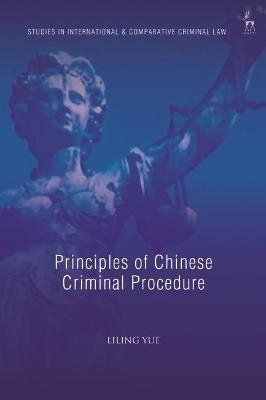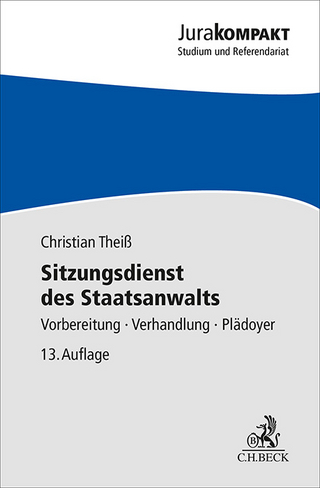
Principles of Chinese Criminal Procedure
Hart Publishing (Verlag)
978-1-5099-3491-1 (ISBN)
The book covers relevant actors in the Chinese Criminal Justice System (ie judges, prosecutors, police, defence councils) as well as the relationships between them. It also includes topics relating to the victims of crime and their role in criminal proceedings. Starting with pre-trial investigations (extending in particular to coercive measures and discretionary powers in the implementation of non-prosecution policies) the book continues as a guide through the basic principles of criminal trial, standards of evidence and rules related to conviction. Appeals and the issue of reopening criminal proceedings are also considered, with the book making particular reference to a number of special procedures (including juvenile delinquency) in the closing chapter.
Liling Yue is Professor of Law in the Criminal Justice Institute at China University of Political Science and Law in Beijing, China.
1. Introduction
I. Subject Matter
II. Chinese Legal Sources and Materials
III. Form of Citations
IV. Content: An Overview
2. The Development of Criminal Procedure Law
I. The Statutes before 1979
A. The First Draft Code of CPL in the Qing Dynasty
B. Republican Period and Wartime (1912–1949)
C. The Foundation of PRC to the End of the Cultural Revolution (1949–1979)
II. The First Effected Modern Code of Criminal Procedure in 1979
III. The Revision of the CPL in 1996
A. Establishing a Principle Similar to the Presumption of Innocence in Western CPLs
B. Increasing the Role of Criminal Defence Lawyers and Establishing the Legal Aid System
IV. The Revision of 2012
A. Improvement of Criminal Defence and Legal Aid
B. Improvement of Evidence Rules and Establishment of Exclusionary Rules
C. Changes to Coercive Measures (Sometimes Called ‘Compulsory Measures’)
D. Special Criminal Proceedings
V. The Revision in 2018
A. Transfer of the Authority to Investigate Corruption and Bribery Cases from the Procuratorates to Supervision Commissions
B. Trial in Absentia
C. The Principle of the Guilty Plea and Leniency Policy
3. Basic Concepts
I. The Aims of Criminal Procedure
II. The Main Sources of Criminal Procedure Law
A. The Constitution
B. The Criminal Procedure Law and Related Laws
C. Other Implementation Rules and Interpretations
III. The Main Stages of Criminal Procedure
IV. Terminological Issues Related to Criminal Procedure
A. Judiciary
B. Coercive Measures
C. Trial
V. The Major Principles Governing Criminal Procedure
A. Constitutional Principles
B. The Principle of the Presumption of Innocence
C. Guilty Plea and Leniency
4. Agencies in the Criminal Justice System
I. Investigative Authorities
A. The Public Security Organs
B. Other Investigative Authorities
C. The Role of the Supervision Commission
II. Procuratorate and Prosecutor in Criminal Justice
A. The Nature of Prosecution Authorities
B. The Organisation and the Roles of the Procuratorate
C. Qualifications of Prosecutors
III. Courts and Judges
A. Court Structure and Jurisdiction
B. The Adjudication Committee
C. The Guiding Case System
D. Judge
E. The People’s Assessor System
5. Other Participants in Criminal Proceedings
I. The Suspect and the Accused
A. Suspect
B. The Accused
II. The Defender
A. Different Categories of Defenders
B. The Role of Defenders in Criminal Proceedings
C. The Defender’s Role in Death Penalty Cases
D. Legal Aid
III. Victims of Crime
A. Definition of ‘Victim of Crime’
B. The Legal Status and Procedural Rights of Victims in Criminal Proceedings
6. Pre-Trial Investigation
I. Initiation of the Investigation Process
II. Coercive Measures
A. Summons for Questioning
B. Release on Guarantee
C. Residential Surveillance
D. Arrest
E. Pre-Trial Detention
F. Citizen’s Right to Arrest a Suspect
G. Pre-Trial Detention and International Human Rights Laws
III. Other Investigative Measures
A. Interrogation of the Suspect and the Accused
B. Interviewing Victims and Witnesses
C. Inspection, Examination and Forensic Evaluation
D. Search and Seizure
E. Technical Measures of Criminal Investigations
IV. Conclusion of Investigation
7. Public Prosecution and First Instance Trial
I. Standards of Prosecution
II. Non-Prosecution Policies
A. Statutory Non-Prosecution
B. Non-Prosecution in Cases with Insufficient Evidence
C. Discretionary Policies of Non-Prosecution of Petty Crime
D. Special Non-Prosecution
III. The Trial
A. Preparation for Trial
B. Trial Phases aft er Public Prosecution Cases Have Been Brought to Court
IV. The Subsidiary Civil Action
V. Private Prosecution Cases
VI. Summary and Expedited Proceedings
8. Criminal Evidence
I. Introduction
II. Definition of Criminal Evidence
III. The Forms of Criminal Evidence
A. Physical Evidence
B. Documentary Evidence
C. Witnesses and the Testimony of Witnesses
D. Statements of Victims
E. Confessions and Exculpations by the Criminal Suspects or the Accused
F. The Exclusionary Rules Addressing Verbal Evidence
G. Expert Opinion
H. Transcripts of Inspection, Examination, Identification, and Investigative Experiment
I. Audio-Visual Evidence and Digital Evidence
9. Remedies
I. Introduction
II. Ordinary Remedy: Appeal
A. The Purpose of the Appeal Process and Setting the Appeal Level
B. Who Has the Right to Appeal?
C. The Grounds of Appeal
D. The Form of the Appellate Hearing
E. Court Decisions in Appeal Cases
III. Extraordinary Remedy: Reopening Criminal Proceedings
A. The Initiation of Reopening Criminal Proceedings
B. The Grounds for Reopening Criminal Proceedings
IV. Death Penalty Review Procedure
A. Introduction
B. Authority of the Review Procedure
C. Review Procedures
D. Decisions of the Final Review
E. Suggestions for Possible Reform
10. Special Procedures
I. Juvenile Criminal Proceedings
A. A Graded System of Criminal Responsibility: Juvenile Criminal Justice
B. Juvenile Crime: Trends and Current Situation
C. Special Proceedings for Juvenile Delinquency
II. Procedures for Reconciliation between Parties in Public Prosecution Cases
A. The Theoretical Basis of Reconciliation in Criminal Matters
B. Application Conditions for Criminal Reconciliation
C. Practice and Reform of Criminal Reconciliation
III. Procedures for Trial in Absentia
A. Types of Cases Eligible for Trial in Absentia
B. Procedural Issues for Trials in Absentia
IV. Procedures for Confiscating the Proceeds of Crime in Cases Where the Accused has Absconded or Died
V. Compulsory Medical Treatment Procedures for Mentally Ill Offenders Who are Exempt from Criminal Liability
| Erscheinungsdatum | 05.11.2021 |
|---|---|
| Reihe/Serie | Studies in International and Comparative Criminal Law |
| Verlagsort | Oxford |
| Sprache | englisch |
| Maße | 156 x 234 mm |
| Gewicht | 522 g |
| Themenwelt | Recht / Steuern ► Allgemeines / Lexika |
| Recht / Steuern ► EU / Internationales Recht | |
| Recht / Steuern ► Strafrecht ► Strafverfahrensrecht | |
| ISBN-10 | 1-5099-3491-X / 150993491X |
| ISBN-13 | 978-1-5099-3491-1 / 9781509934911 |
| Zustand | Neuware |
| Haben Sie eine Frage zum Produkt? |
aus dem Bereich


